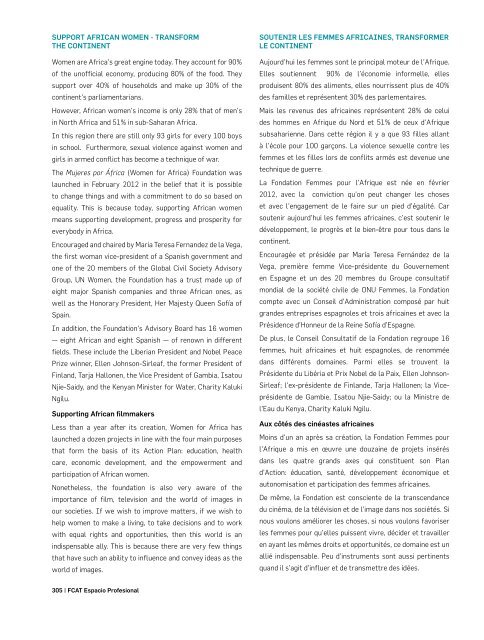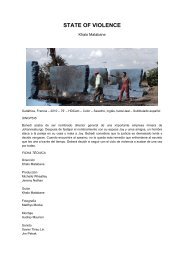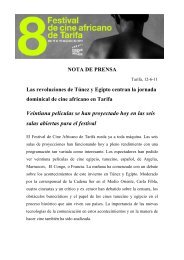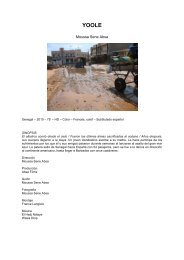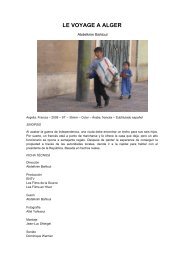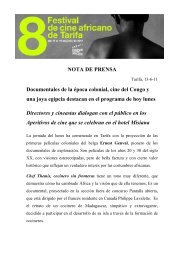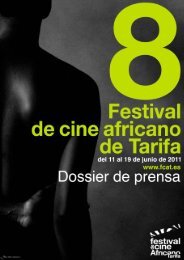Catálogo - FCAT
Catálogo - FCAT
Catálogo - FCAT
Create successful ePaper yourself
Turn your PDF publications into a flip-book with our unique Google optimized e-Paper software.
SUPPORT AFRICAN WOMEN - TRANSFORM<br />
THE CONTINENT<br />
Women are Africa’s great engine today. They account for 90%<br />
of the unofficial economy, producing 80% of the food. They<br />
support over 40% of households and make up 30% of the<br />
continent’s parliamentarians.<br />
However, African women’s income is only 28% that of men’s<br />
in North Africa and 51% in sub-Saharan Africa.<br />
In this region there are still only 93 girls for every 100 boys<br />
in school. Furthermore, sexual violence against women and<br />
girls in armed conflict has become a technique of war.<br />
The Mujeres por África (Women for Africa) Foundation was<br />
launched in February 2012 in the belief that it is possible<br />
to change things and with a commitment to do so based on<br />
equality. This is because today, supporting African women<br />
means supporting development, progress and prosperity for<br />
everybody in Africa.<br />
Encouraged and chaired by Maria Teresa Fernandez de la Vega,<br />
the first woman vice-president of a Spanish government and<br />
one of the 20 members of the Global Civil Society Advisory<br />
Group, UN Women, the Foundation has a trust made up of<br />
eight major Spanish companies and three African ones, as<br />
well as the Honorary President, Her Majesty Queen Sofía of<br />
Spain.<br />
In addition, the Foundation’s Advisory Board has 16 women<br />
— eight African and eight Spanish — of renown in different<br />
fields. These include the Liberian President and Nobel Peace<br />
Prize winner, Ellen Johnson-Sirleaf, the former President of<br />
Finland, Tarja Hallonen, the Vice President of Gambia, Isatou<br />
Njie-Saidy, and the Kenyan Minister for Water, Charity Kaluki<br />
Ngilu.<br />
Supporting African filmmakers<br />
Less than a year after its creation, Women for Africa has<br />
launched a dozen projects in line with the four main purposes<br />
that form the basis of its Action Plan: education, health<br />
care, economic development, and the empowerment and<br />
participation of African women.<br />
Nonetheless, the foundation is also very aware of the<br />
importance of film, television and the world of images in<br />
our societies. If we wish to improve matters, if we wish to<br />
help women to make a living, to take decisions and to work<br />
with equal rights and opportunities, then this world is an<br />
indispensable ally. This is because there are very few things<br />
that have such an ability to influence and convey ideas as the<br />
world of images.<br />
SOUTENIR LES FEMMES AFRICAINES, TRANSFORMER<br />
LE CONTINENT<br />
Aujourd’hui les femmes sont le principal moteur de l’Afrique.<br />
Elles soutiennent 90% de l’économie informelle, elles<br />
produisent 80% des aliments, elles nourrissent plus de 40%<br />
des familles et représentent 30% des parlementaires.<br />
Mais les revenus des africaines représentent 28% de celui<br />
des hommes en Afrique du Nord et 51% de ceux d’Afrique<br />
subsaharienne. Dans cette région il y a que 93 filles allant<br />
à l’école pour 100 garçons. La violence sexuelle contre les<br />
femmes et les filles lors de conflits armés est devenue une<br />
technique de guerre.<br />
La Fondation Femmes pour l’Afrique est née en février<br />
2012, avec la conviction qu’on peut changer les choses<br />
et avec l’engagement de le faire sur un pied d’égalité. Car<br />
soutenir aujourd’hui les femmes africaines, c’est soutenir le<br />
développement, le progrès et le bien-être pour tous dans le<br />
continent.<br />
Encouragée et présidée par María Teresa Fernández de la<br />
Vega, première femme Vice-présidente du Gouvernement<br />
en Espagne et un des 20 membres du Groupe consultatif<br />
mondial de la société civile de ONU Femmes, la Fondation<br />
compte avec un Conseil d’Administration composé par huit<br />
grandes entreprises espagnoles et trois africaines et avec la<br />
Présidence d’Honneur de la Reine Sofía d’Espagne.<br />
De plus, le Conseil Consultatif de la Fondation regroupe 16<br />
femmes, huit africaines et huit espagnoles, de renommée<br />
dans différents domaines. Parmi elles se trouvent la<br />
Présidente du Libéria et Prix Nobel de la Paix, Ellen Johnson-<br />
Sirleaf; l’ex-présidente de Finlande, Tarja Hallonen; la Viceprésidente<br />
de Gambie, Isatou Njie-Saidy; ou la Ministre de<br />
l’Eau du Kenya, Charity Kaluki Ngilu.<br />
Aux côtés des cinéastes africaines<br />
Moins d’un an après sa création, la Fondation Femmes pour<br />
l’Afrique a mis en œuvre une douzaine de projets insérés<br />
dans les quatre grands axes qui constituent son Plan<br />
d’Action: éducation, santé, développement économique et<br />
autonomisation et participation des femmes africaines.<br />
De même, la Fondation est consciente de la transcendance<br />
du cinéma, de la télévision et de l’image dans nos sociétés. Si<br />
nous voulons améliorer les choses, si nous voulons favoriser<br />
les femmes pour qu’elles puissent vivre, décider et travailler<br />
en ayant les mêmes droits et opportunités, ce domaine est un<br />
allié indispensable. Peu d’instruments sont aussi pertinents<br />
quand il s’agit d’influer et de transmettre des idées.<br />
305 | <strong>FCAT</strong> Espacio Profesional


